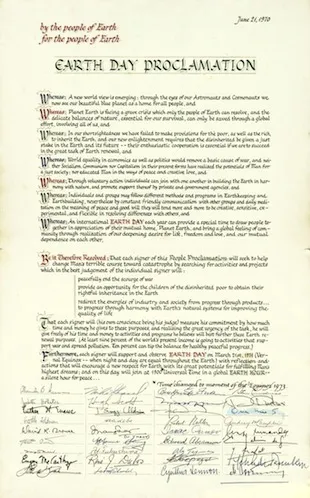Original Earth Day Proclamation Arrives on Campus in Time for This Year's Celebration

The original 1970 Earth Day Proclamation, signed by 35 international dignitaries, is now a permanent part of the Swarthmore College Peace Collection, thanks to a gift from the family of its author.
"John McConnell's work for the last 50 years helped many to connect international peace with the need to preserve the environment," says Wendy Chmielewski, the Collection's George R. Cooley Curator, of the holiday's founder. "McConnell reached many world leaders, as the Earth Day Proclamation shows, but his message also inspired ordinary people around the globe."
In 1968, McConnell, a Presbyterian minister and peace activist from Iowa, designed the Earth Day flag showing planet Earth as seen from space. He proposed the idea of Earth Day the next year in order to celebrate a peaceful planet. McConnell also authored a second proclamation, the Star of Hope, with signatures from world scientists. That doucument, as well as a large collection of McConnell's papers detailing his 50-plus years of work for world peace, is also part of the Collection.
The Earth Day proclamation is a poster-sized, hand-created, and hand-colored document. Among the 35 signators are anthropologist Margaret Mead, former Senator Eugene McCarthy, Nobel Prize-winning former President of Costa Rica Oscar Arias, Soviet leader Mikhail Gorbachev, and astronaut Buzz Aldrin. Earth Day is now celebrated internationally on the Vernal Equinox.
The Swarthmore College Peace Collection is one of the most extensive research libraries and archive collections in the country that focuses solely on movements for peace. The Collection's holdings on the environmental movement span the papers and records of numerous peace organizations and activists who have worked for the benefit of the environment during the second half of the 20th-century and beyond.



